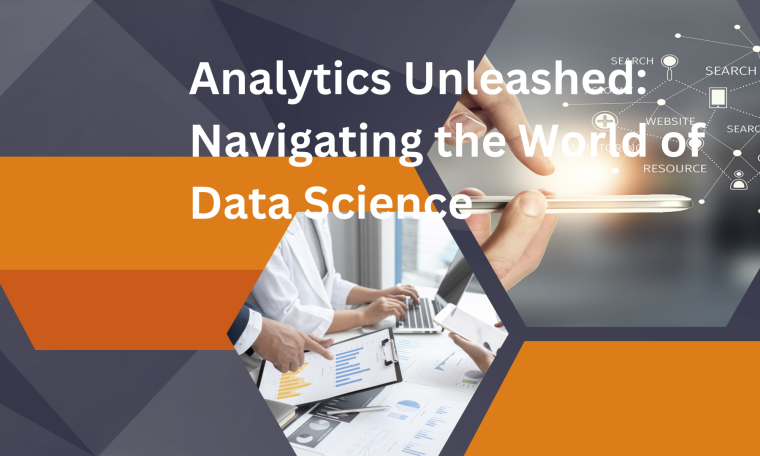
Introduction:
In the era of digital transformation, data has emerged as a powerful currency that drives innovation and decision-making across industries. The field of Data Science has become a cornerstone in unlocking the potential hidden within vast datasets, providing actionable insights and shaping the future of businesses. This article delves into the realm of Data Science, exploring its evolution, significance, and the transformative power it holds in today’s data-driven world.
The Evolution of Data Science:
Data Science, as a discipline, has evolved significantly over the years. Initially, it was primarily associated with statistics and data analysis. However, with the advent of big data, advanced technologies, and machine learning, the scope of Data Science has expanded exponentially. Today, it encompasses a multidisciplinary approach, blending statistical analysis, computer science, domain knowledge, and visualization techniques to extract meaningful information from complex datasets.
The Significance of Data Science:
Informed Decision-Making:
- One of the primary roles of Data Science is to enable informed decision-making. By analyzing historical data, identifying patterns, and predicting future trends, organizations can make strategic decisions that drive growth and efficiency.
Operational Efficiency:
- Data Science plays a pivotal role in enhancing operational efficiency. Through the automation of repetitive tasks, optimization of processes, and predictive maintenance, businesses can streamline operations and reduce costs.
Personalized Experiences:
- In the age of personalization, Data Science empowers businesses to tailor products, services, and marketing strategies to individual preferences. This not only improves customer satisfaction but also fosters brand loyalty.
Risk Management:
- Analyzing data allows organizations to assess and mitigate risks effectively. Whether it’s identifying potential fraud, predicting market fluctuations, or evaluating the impact of external factors, Data Science provides valuable insights for risk management.
The Transformative Power of Data Science:
Machine Learning and Artificial Intelligence:
- Machine Learning, a subset of Data Science, involves the development of algorithms that enable systems to learn from data and make predictions. Artificial Intelligence (AI) leverages these algorithms to simulate human intelligence, leading to innovations like autonomous vehicles, chatbots, and image recognition.
Predictive Analytics:
- Predictive analytics uses statistical algorithms and machine learning techniques to forecast future outcomes based on historical data. Businesses leverage predictive analytics to anticipate market trends, customer behavior, and even potential equipment failures.
Natural Language Processing (NLP):
- NLP enables computers to understand, interpret, and generate human-like text. This technology is crucial for applications like chatbots, sentiment analysis, and language translation, enhancing communication between machines and humans.
Data Visualization:
- Communicating insights effectively is as important as extracting them. Data visualization tools transform complex datasets into visually appealing and comprehensible graphics, aiding decision-makers in understanding trends, patterns, and outliers.
The Role of Data Scientists:
In the dynamic landscape of Data Science, the role of a data scientist is pivotal. Data scientists are professionals equipped with a combination of technical skills, domain expertise, and business acumen. They are responsible for collecting and analyzing large volumes of data, developing models, and translating findings into actionable insights. As the demand for data scientists continues to grow, individuals with expertise in programming, statistics, and machine learning find themselves at the forefront of the analytics revolution.
The Future of Data Science:
The future of Data Science promises even greater advancements and applications. Here are some trends shaping the trajectory of this field:
Edge Analytics:
- With the proliferation of Internet of Things (IoT) devices, edge analytics is gaining prominence. This involves processing data closer to the source (at the edge of the network) rather than relying solely on centralized cloud servers, enhancing real-time processing and reducing latency.
Explainable AI:
- As AI becomes more integrated into decision-making processes, the need for explainable AI is increasing. Understanding how AI models arrive at specific conclusions is crucial for transparency and trust, especially in sensitive domains like healthcare and finance.
Augmented Analytics:
- Augmented analytics combines machine learning and natural language processing to automate data preparation, insight discovery, and sharing. This trend empowers business users to make data-driven decisions without requiring advanced technical skills.
Ethical AI:
- As the influence of AI grows, so does the importance of ethical considerations. Addressing biases in algorithms, ensuring privacy, and promoting responsible AI practices are becoming integral aspects of Data Science.
Understanding Data Science:
Defining Data Science:
At its core, data science is the interdisciplinary field that utilizes scientific methods, processes, algorithms, and systems to extract insights and knowledge from structured and unstructured data.
Components of Data Science:
- Data Collection: The foundation of data science lies in collecting relevant and diverse datasets.
- Data Cleaning: The process of refining raw data to ensure accuracy and reliability.
- Data Analysis: Employing statistical methods and machine learning algorithms to derive meaningful patterns.
- Data Visualization: Transforming complex data into comprehensible visuals for effective communication.
Applications of Data Science:
- Business Intelligence:Data science empowers businesses with actionable insights, enabling informed decision-making, forecasting, and market analysis.
- Healthcare:In the healthcare sector, data science plays a crucial role in disease prediction, patient care optimization, and drug discovery.
- Finance:From fraud detection to risk assessment, data science enhances financial operations by providing real-time analytics.
4. E-commerce:Personalized recommendations, inventory management, and customer segmentation are revolutionized by data science in the e-commerce realm.
The Power of Predictive Analytics:
Harnessing Predictive Analytics:
- Predictive Modeling: Building models that forecast future trends based on historical data.
- Risk Assessment: Identifying potential risks and mitigating them before they escalate.
- Customer Behavior Prediction: Understanding and anticipating customer preferences for tailored services.
- Real-world Applications:From weather forecasting to stock market predictions, predictive analytics is omnipresent, offering insights that drive strategic decision-making.
Challenges in Data Science:
- Data Privacy and Security:As data becomes more valuable, ensuring its security and respecting privacy concerns present ongoing challenges for the data science community.
- Skill Shortage:The demand for skilled data scientists surpasses the current supply, highlighting the need for comprehensive education and training programs.
- Ethical Considerations:As data science evolves, ethical dilemmas arise, requiring careful navigation of issues related to bias, fairness, and accountability.
Conclusion:
In the realm of data science, the journey is as important as the destination. “Analytics Unleashed” is a testament to the transformative power of data science and its ability to shape industries, drive innovation, and solve complex problems. Navigating this world requires a commitment to continuous learning, ethical considerations, and a keen understanding of the evolving trends that will define the future of data science. As we embark on this journey, one thing is certain – the potential of data science is boundless, and those who embrace it will undoubtedly be at the forefront of shaping the future. If you are seeking a Data Science course provider in Indore, Delhi, Lucknow, Noida, and all cities in India, finding the right educational institution is crucial for embarking on a successful career in this dynamic field.



